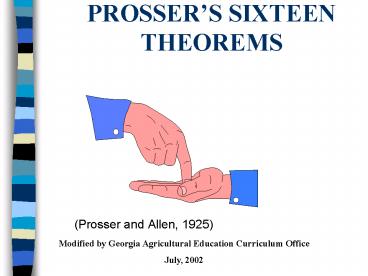PROSSERS SIXTEEN THEOREMS - PowerPoint PPT Presentation
1 / 19
Title:
PROSSERS SIXTEEN THEOREMS
Description:
Single most influential person in development of ... 6. Gainful Employment ... that these habits become fixed to the degree necessary for gainful employment. ... – PowerPoint PPT presentation
Number of Views:766
Avg rating:3.0/5.0
Title: PROSSERS SIXTEEN THEOREMS
1
PROSSERS SIXTEEN THEOREMS
- (Prosser and Allen, 1925)
Modified by Georgia Agricultural Education
Curriculum Office July, 2002
2
Charles Prosser
- Single most influential person in development of
vocational education in US. - First Executive Director of NSPIE
- Essentially wrote Smith-Hughes Act
- Work led to founding of AVA
3
1. Work Environment
- Vocational education will be efficient in
proportion as the environment in which the
learner is trained is a replica of the
environment in which he must subsequently work.
4
2. Industry Standards
- Effective vocational training can only be given
where the training jobs are carried on in the
same way, with the same operations, the same
tools, and the same machines as in the occupation
itself.
5
3. Work Habits
- Vocational education will be effective in
proportion as it trains the individual directly
and specifically in the thinking habits and the
manipulative habits required in the occupation
itself.
6
4. Individual Needs
- Vocational education will be effective in
proportion as it enables each individual to
capitalize on his interests, aptitudes, and
intrinsic intelligence to the highest degree.
7
5. Elective
- Effective vocational education for any
profession, trade,occupation, or job can only
be given tothe selected group of individuals
who need it, want it, and are able to profit by
it.
8
6. Gainful Employment
- Vocational training will be effective in
proportion as the specific training experiences
for forming right habits of doing and thinking
are repeated to the point that these habits
become fixed to the degree necessary for gainful
employment.
9
7. Craftsperson Teacher
- Vocational education will be effective in
proportion as the instructor has had successful
experiences in the application of skills and
knowledge to the operations and processes he
undertakes to teach.
10
8. Performance Standards
- For every occupation there is a minimum of
productive ability which an individual must
possess in order to secure or retain employment
in that occupation.
11
9. Industry Needs
- Vocational education must recognize conditions
as they are and must train individuals to meet
the demands of the market even though it may be
true that more efficient ways for conducting the
occupation may be known and better working
conditions are highly desirable.
12
10. Actual Jobs
- The effective establishment of process habits in
any learner will be secured in proportion as the
training is given on actual jobs and not on
exercises or pseudo jobs.
13
11. Content from Occupation
- The only reliable source of content for specific
training in an occupation is in the experiences
of masters of that occupation.
14
12. Specific Job Training
- For every occupation there is a body of content
which is peculiar to that occupation and which
practically has no functioning value in any
other occupation.
15
13. Group Needs
- Vocational education will render efficient social
services in proportion as it meets the specific
training needs of any group at the time that they
need it and in such a way that they can most
effectively profit by the instruction.
16
14. Group Characteristics
- Vocational education will be socially efficient
in proportion as in its methods of instruction
and its personal relations with learners it takes
into consideration the particular characteristics
of any particular group which it serves.
17
15. Dual Administration
- The administration of vocational education will
be efficient in proportion as it is elastic and
fluid rather than rigid and standardized.
18
16. Program Standards
- While every reasonable effort should be made to
reduce per capita cost, there is a minimum level
below which effective vocational education cannot
be given, and if the course does not permit this
minimum of per capita cost, vocational education
should not be attempted.
19
Prossers Theorems
- Basis on which vocational education in US was
built - Influence still felt
- Even today, much of Prossers thinking is still
valid

